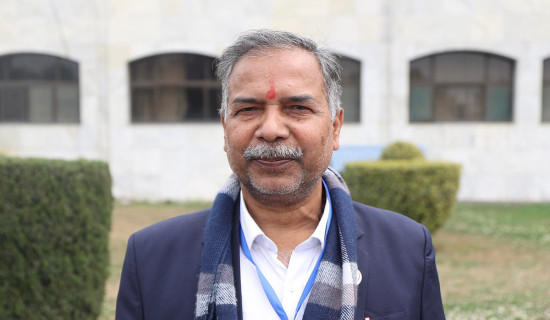- Tuesday, 30 December 2025
Elderly Regain Sight Through Cataract Treatment
Untreated cataracts persist as Nepal's primary cause of bilateral blindness, a critical issue compounded by longer lifespans and limited utilisation of cataract surgery. The country faces a significant challenge with untreated cataracts, especially among its ageing demographic, resulting in bilateral blindness. The prolonged existence of untreated cataract patients is attributed to both the longevity of individuals and their inability to access cataract surgical services. This challenge has created a growing pool of individuals facing compromised vision and its subsequent impact on their daily lives.
According to the World Health Organisation, it is estimated that globally, only 17 per cent of people with vision impairment due to cataracts have received access to an appropriate intervention.
Cataract surgery emerges as the sole solution to remove cataracts and restore clear vision. During this surgical procedure, an ophthalmologist removes the clouded natural lens and replaces it with an intraocular lens (IOL), a crucial step towards reclaiming visual clarity. Various hospitals across Nepal, recognising the urgency of addressing this issue, have been contributing to providing cataract surgery services.
For instance, Biratnagar Eye Hospital, situated in the bustling city of Biratnagar, stands at the forefront of delivering comprehensive eye care services in Eastern Nepal. The hospital plays a pivotal role in combating the untreated cataract crisis by organising cataract screening camps.
A cataract screening camp is a diagnostic procedure performed by an eye care professional to detect cataracts, which are clouding of the eye's natural lens, leading to a decrease in vision. These camps extend the hospital's reach to remote communities, identifying individuals in need and providing them with the necessary information and assistance.
A recent cataract screening camp held at Barju Rural Municipality in the Sunsari district of Koshi Province by the Biratnagar Eye Hospital has given a heartwarming example of the impact of such outreach efforts. The camp unveiled a significant demand, evident in the long queues of people seeking assistance. Among them was 80-year-old Yad Bali Ram, a man who had endured cataract-related issues in his right eye for three years.
Accompanied by his 65-year-old son, Yad Bali Ram's screening in the camp proved to be a turning point in his life. The hospital's dedicated team screened and identified that he had a cataract in his right eye. They informed him about the availability of free surgery at the hospital. Yad Bali Ram, burdened by economic limitations, expressed intense happiness upon learning about the opportunity for timely treatment.
The barrier to accessibility and affordability of services that impact the health and well-being of community members is not a new story to us. Against the same backdrop, Yad Bali Ram's story shows the struggles faced by many in Nepal—economic limitations preventing them from seeking necessary medical care. Living in a family of five and relying on agriculture for their fundamental needs, Yad Bali Ram's eye problems had created a noticeable gap between himself and his grandson. The assistance required to perform his day-to-day activities was a burden for him. Not being able to spend quality time with a family member and do anything on his own reduced his self-confidence, left him isolated from his social life, and disappointed him in his elderly phase of life, in which he would rather live in peace and happiness.
The persistence of Yad Bali Ram's eye issues significantly hampered his family members' daily routine as well, since one of the family members had to assist him and could not be engaged in income-generating activity, which was seen to be necessary to manage the family's financial crisis. Despite dedicating a substantial part of his life to looking after his family's needs, Yad Bali Ram found himself constrained by a health issue that could be addressed through proper medical intervention.
Having previously undergone surgery for his left eye due to cataracts, Yad Bali Ram eagerly anticipated the arrival of the screening camp in Barju Rural Municipality. Following the surgery on his right eye, he expressed immense gratitude, describing the restoration of his vision as the greatest gift for himself and his grandchildren. The surgery not only enhanced his self-confidence and improved his well-being but also enabled him to actively interact and play with his grandchild, bridging the gap created by impaired vision.
For economically challenged patients like him, the hospital's accessible and invaluable services proved to be a lifeline. Yad Bali Ram expressed profound gratitude for the support extended to those in need, underscoring the hospital's dedication to providing top-notch, affordable, and easily accessible eye care services to all.
In conclusion, untreated cataracts in Nepal pose a significant threat to the vision and well-being of its population. Biratnagar Eye Hospital's proactive approach is exemplified by cataract screening camps and accessible services. The hospital's commitment to delivering high-quality, affordable, and accessible eye care is transforming lives, bridging the gap between impaired vision and a future of clarity for many in Nepal.
(The author is a communication and documentation associate at eye care facilities in Biratnagar.)
















